
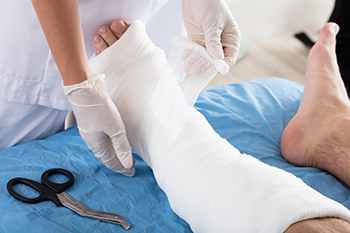
Total contact casting, or TCC, is a specialized technique used by podiatrists to treat diabetic foot ulcers by alleviating pressure on areas susceptible to skin breakdown. This method involves the application of a fiberglass or plaster cast molded to the foot's contours, which allows for even distribution of weight across the entire foot, rather than concentrating it on vulnerable spots. Total contact casting helps protect the ulcer and fosters a healing environment while allowing patients to remain mobile. It is primarily used for diabetic foot ulcers and Charcot foot, with careful monitoring required due to the potential for reduced sensation in diabetic patient's feet. Proper application includes cushioning, protective padding, and ensuring the cast is kept dry to prevent complications. The cast is typically replaced weekly until the ulcer heals sufficiently for normal footwear or orthotics. Consulting a podiatrist ensures appropriate application and monitoring of a total contact cast, preventing further complications. If you have developed diabetic foot ulcers, it is suggested that you schedule an appointment with a podiatrist to see if total contact casting is right for you.
Diabetic foot care is important in preventing foot ailments such as ulcers. If you are suffering from diabetes or have any other concerns about your feet, contact Dr. Stephan J. LaPointe from Georgia Foot & Ankle Specialists . Our doctor can provide the care you need to keep you pain-free and on your feet.
Diabetic Foot Care
Diabetes affects millions of people every year. The condition can damage blood vessels in many parts of the body, especially the feet. Because of this, taking care of your feet is essential if you have diabetes, and having a podiatrist help monitor your foot health is highly recommended.
The Importance of Caring for Your Feet
Patients with diabetes should have their doctor monitor their blood levels, as blood sugar levels play such a huge role in diabetic care. Monitoring these levels on a regular basis is highly advised.
It is always best to inform your healthcare professional of any concerns you may have regarding your feet, especially for diabetic patients. Early treatment and routine foot examinations are keys to maintaining proper health, especially because severe complications can arise if proper treatment is not applied.
If you have any questions please feel free to contact our office located in Rome, GA . We offer the newest diagnostic and treatment technologies for all your foot and ankle needs.
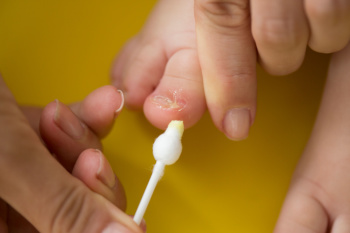
Ingrown toenails in children often result from improper nail trimming, wearing tight footwear, or injury. When nails are cut too short or rounded at the edges, they can grow into the surrounding skin, leading to pain, swelling, and sometimes infection. Tight shoes or socks can put pressure on the toes, encouraging the nails to grow inward. Additionally, stubbing a toe or repeated trauma from activities like running can contribute to the problem. To prevent ingrown toenails, ensure that children wear properly fitting shoes and socks that provide enough room for their toes. Trim their nails straight across and avoid cutting them too short. Encouraging children to be cautious during physical activities can also help reduce the risk of injury to their toenails. If you suspect your child has an ingrown toenail, it is suggested that you consult a podiatrist.
Ingrown toenails can become painful if they are not treated properly. For more information about ingrown toenails, contact Dr. Stephan J. LaPointe of Georgia Foot & Ankle Specialists . Our doctor can provide the care you need to keep you pain-free and on your feet.
Ingrown Toenails
Ingrown toenails occur when a toenail grows sideways into the bed of the nail, causing pain, swelling, and possibly infection.
Causes
Prevention
Because ingrown toenails are not something found outside of shoe-wearing cultures, going barefoot as often as possible will decrease the likeliness of developing ingrown toenails. Wearing proper fitting shoes and using proper cutting techniques will also help decrease your risk of developing ingrown toenails.
Treatment
Ingrown toenails are a very treatable foot condition. In minor cases, soaking the affected area in salt or antibacterial soaps will not only help with the ingrown nail itself, but also help prevent any infections from occurring. In more severe cases, surgery is an option. In either case, speaking to your podiatrist about this condition will help you get a better understanding of specific treatment options that are right for you.
If you have any questions please feel free to contact our office located in Rome, GA . We offer the newest diagnostic and treatment technologies for all your foot and ankle needs.
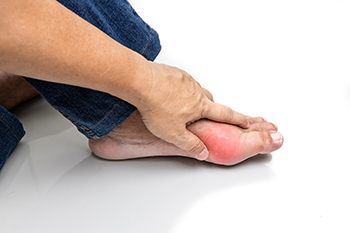
Gout is a form of inflammatory arthritis that leads to sudden and intense joint pain, often affecting the big toe and usually occurring at night. It can also target the other toes as well as the ankles. Gout arises from having high levels of uric acid in the blood. This substance forms from the breakdown of purines found in foods like red meat, organ meats, certain seafood, sugary sodas, and beer. Excess uric acid can form needle-like crystals in the joints that cause severe pain and swelling. Men are three times more likely to develop gout than women, particularly after age 40. Women become more susceptible post-menopausal because of a decrease in estrogen levels. Risk factors for gout include a diet high in purine-rich foods, high-fructose corn syrup, excessive alcohol consumption, obesity, and a family history of gout. Chronic conditions like diabetes, kidney disease, and certain high blood pressure medications are other factors. A podiatrist can diagnose gout through joint fluid analysis, blood tests, and imaging to detect uric acid crystals. If you have sudden and severe pain in the big toe that may be due to gout, it is suggested that you schedule an appointment with a podiatrist for a diagnosis and treatment options.
Gout is a foot condition that requires certain treatment and care. If you are seeking treatment, contact Dr. Stephan J. LaPointe from Georgia Foot & Ankle Specialists . Our doctor will treat your foot and ankle needs.
What Is Gout?
Gout is a type of arthritis caused by a buildup of uric acid in the bloodstream. It often develops in the foot, especially the big toe area, although it can manifest in other parts of the body as well. Gout can make walking and standing very painful and is especially common in diabetics and the obese.
People typically get gout because of a poor diet. Genetic predisposition is also a factor. The children of parents who have had gout frequently have a chance of developing it themselves.
Gout can easily be identified by redness and inflammation of the big toe and the surrounding areas of the foot. Other symptoms include extreme fatigue, joint pain, and running high fevers. Sometimes corticosteroid drugs can be prescribed to treat gout, but the best way to combat this disease is to get more exercise and eat a better diet.
If you have any questions please feel free to contact our office located in Rome, GA . We offer the newest diagnostic and treatment technologies for all your foot and ankle needs.
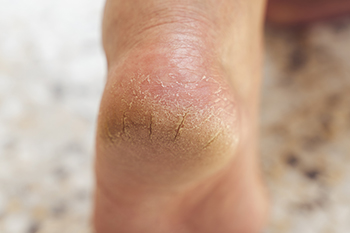 Cracked heels, medically known as keratoderma, is a condition where the skin on the heels becomes thick, dry, and eventually splits. This often painful issue arises from prolonged pressure on the feet, leading to hard, callused skin that can fissure. Causes include standing for long periods, wearing open-backed shoes, and exposure to dry, cold weather. Medical conditions like diabetes and hypothyroidism also contribute by causing excessively dry skin. Excessive weight increases pressure on the heel pads, further worsening the problem. Preventing keratoderma involves regular moisturizing, wearing supportive, closed-back footwear, and avoiding prolonged standing on hard surfaces. Proper foot care routines, including gentle exfoliation and hydration, are essential to maintain soft, healthy skin and prevent the discomfort associated with cracked heels. This condition can be painful. If this applies to you, it is suggested that you visit a podiatrist who can effectively treat cracked heels, which often includes prescribed medication.
Cracked heels, medically known as keratoderma, is a condition where the skin on the heels becomes thick, dry, and eventually splits. This often painful issue arises from prolonged pressure on the feet, leading to hard, callused skin that can fissure. Causes include standing for long periods, wearing open-backed shoes, and exposure to dry, cold weather. Medical conditions like diabetes and hypothyroidism also contribute by causing excessively dry skin. Excessive weight increases pressure on the heel pads, further worsening the problem. Preventing keratoderma involves regular moisturizing, wearing supportive, closed-back footwear, and avoiding prolonged standing on hard surfaces. Proper foot care routines, including gentle exfoliation and hydration, are essential to maintain soft, healthy skin and prevent the discomfort associated with cracked heels. This condition can be painful. If this applies to you, it is suggested that you visit a podiatrist who can effectively treat cracked heels, which often includes prescribed medication.
If the skin on your feet starts to crack, you may want to see a podiatrist to find treatment. If you have any concerns, contact Dr. Stephan J. LaPointe from Georgia Foot & Ankle Specialists . Our doctor can provide the care you need to keep you pain-free and on your feet.
Cracked Heels
It is important to moisturize your cracked heels in order to prevent pain, bleeding, and infection. The reason cracked heels form is because the skin on the foot is too dry to support the immense pressure placed on them. When the foot expands, the dry skin on the foot begins to split.
Ways to Help Heal Them
Ways to Prevent Cracked Heels
If you are unsure how to proceed in treating cracked heels, seek guidance from a podiatrist. Your doctor will help you with any questions or information you may need.
If you have any questions, please feel free to contact our office located in Rome, GA . We offer the newest diagnostic and treatment technologies for all your foot care needs.
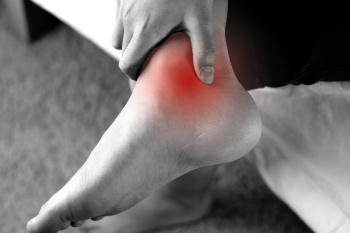
Tarsal tunnel syndrome is a condition caused by the compression of the posterior tibial nerve as it travels through the tarsal tunnel, a narrow space inside the ankle. This tunnel is formed by bone and a dense band of tissue called the flexor retinaculum. The posterior tibial nerve, along with arteries, veins, and tendons, passes through this confined space, providing sensation to the bottom of the foot and motor function to the muscles. When the nerve is compressed, it can cause pain, numbness, and tingling in the foot and ankle. Factors contributing to this condition include inflammation, injury, or structural issues such as flat feet. Tarsal tunnel syndrome can cause pain and discomfort. If you have this condition, it is suggested that you visit a podiatrist who can effectively treat this ailment.
Tarsal tunnel syndrome can be very uncomfortable to live with. If you are experiencing tarsal tunnel syndrome, contact Dr. Stephan J. LaPointe of Georgia Foot & Ankle Specialists . Our doctor can provide the care you need to keep you pain-free and on your feet.
Tarsal Tunnel Syndrome
Tarsal tunnel syndrome, which can also be called tibial nerve dysfunction, is an uncommon condition of misfiring peripheral nerves in the foot. The tibial nerve is the peripheral nerve in the leg responsible for sensation and movement of the foot and calf muscles. In tarsal tunnel syndrome, the tibial nerve is damaged, causing problems with movement and feeling in the foot of the affected leg.
Common Cause of Tarsal Tunnel Syndrome
The Effects of Tarsal Tunnel Syndrome
A physical exam of the leg can help identify the presence of tarsal tunnel syndrome. Medical tests, such as a nerve biopsy, are also used to diagnose the condition. Patients may receive physical therapy and prescriptive medication. In extreme cases, some may require surgery.
If you have any questions please feel free to contact our office located in Rome, GA . We offer the newest diagnostic and treatment technologies for all your foot and ankle needs.